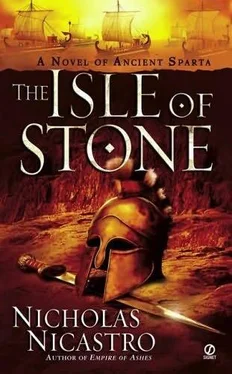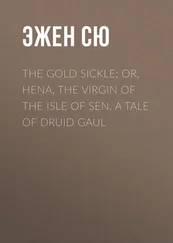Nicholas Nicastro - The Isle of Stone
Здесь есть возможность читать онлайн «Nicholas Nicastro - The Isle of Stone» весь текст электронной книги совершенно бесплатно (целиком полную версию без сокращений). В некоторых случаях можно слушать аудио, скачать через торрент в формате fb2 и присутствует краткое содержание. Жанр: Исторические приключения, на английском языке. Описание произведения, (предисловие) а так же отзывы посетителей доступны на портале библиотеки ЛибКат.
- Название:The Isle of Stone
- Автор:
- Жанр:
- Год:неизвестен
- ISBN:нет данных
- Рейтинг книги:4 / 5. Голосов: 1
-
Избранное:Добавить в избранное
- Отзывы:
-
Ваша оценка:
- 80
- 1
- 2
- 3
- 4
- 5
The Isle of Stone: краткое содержание, описание и аннотация
Предлагаем к чтению аннотацию, описание, краткое содержание или предисловие (зависит от того, что написал сам автор книги «The Isle of Stone»). Если вы не нашли необходимую информацию о книге — напишите в комментариях, мы постараемся отыскать её.
The Isle of Stone — читать онлайн бесплатно полную книгу (весь текст) целиком
Ниже представлен текст книги, разбитый по страницам. Система сохранения места последней прочитанной страницы, позволяет с удобством читать онлайн бесплатно книгу «The Isle of Stone», без необходимости каждый раз заново искать на чём Вы остановились. Поставьте закладку, и сможете в любой момент перейти на страницу, на которой закончили чтение.
Интервал:
Закладка:
“I can feel him,” she reported.
As her labor went on Lampito excoriated Andreia for waiting so long without calling for help. “Do you think you’d do this yourself? Don’t look at me, push now. The selfishness of girls today is a scandal; it’s a wonder you bother to make babies at all-PUSH!”
The rhythm of exertion and rest went on for hours, until night came and Lampito had Melitta fetch oil for the lamps. Sometime after midnight, with Andreia so spent that she was falling asleep between contractions, the old woman reached inside her again. As she pushed the birth canal down, blood and amniotic fluid shining on her leathery hands soaked into the earthen floor. Lampito peeped within with her good eye, then winked at Andreia.
“He has red hair.”
Melitta watched agape as her brother was delivered, flipped over, and liberated from his cord by a carving knife. After washing him, Lampito put the infant on his mother’s stomach. All watched in wonder as he crept toward the breast.
“Our little soldier finds his own mess,” the old woman said, pleased.
Andreia slept for thirty-six hours after the birth. Lampito stayed by her side, keeping her clean, guiding the newborn’s rooting mouth to her nipples. When she awoke, Andreia was confused by the presence of the stranger, but remembered her arrival when she felt the infant bundled at her side.
“Who are you?” she asked Lampito again.
“Sparta has become too big, when relatives don’t know each other.”
She explained that she was Antalcidas’ grandmother on his father’s side, and that Damatria had summoned her after the attack.
“Then the lady Damatria has done us a kindness,” said Andreia.
Lampito tossed her head. “Perhaps.”
The newborn began to cough; Andreia gathered him closer and rocked him. Then she noticed his color.
“Why is he so blue?”
“His lungs are weak. It is not unusual with children born so early. He may not survive.”
Andreia reflexively covered the baby’s ears. This prognosis, however justified, struck her as needlessly cruel to say aloud.
But in time it became clear that something was wrong with the child. In the following days his breathing became more labored, with his color never improving beyond a sickly plum purple. His breaths became so shallow at night that his mother had to put her ear to his chest to see if his heart still beat. The struggle to catch his breath would wake him up after no more than a few minutes of sleep at a time-a schedule that also gave Andreia no time to rest. Lampito watched them suffer, fully knowing the only end that could await the boy. But she kept her thoughts to herself.
Andreia would not raise a hand in surrender. With Antalcidas away, she took it upon herself to give his son a name she thought would please him: Molobrus, after the boy’s grandfather. And despite what had befallen her the last time she walked the streets of Sparta, she insisted on going out herself, with Melitta in tow, to register the name at the city magistrate’s. As a precaution, she hid the boy’s unhealthy color by wrapping him in blankets. This earned her an unexpected bonus: swaddled babies were such a rarity in Sparta that passersby gawked at the baby and hardly noticed the trembler’s wife.
Yet the day Andreia dreaded came on with pitiless speed. Over the weeks she and Lampito had exhausted the known remedies, both practical and divine. She hired a professional root-cutter to gather medicinal herbs under the light of the full moon. With Damatria’s word as credit, she spared no expense on ointments, including one made with truffles, silver rust, crushed black ants, and the gallbladder of a freshly killed brown bear. She sent expensive dedications to the Sanctuary of Asclepius at Epidauros, and inquired about bringing an adept of the healer-god to tend little Molobrus in Kynosoura. But when they turned to this last recourse it was too late for the priest to arrive in time.
They came for the prescreening at dawn the day before the judgment. The official of the ephorate was as dreary looking as his errand, regarding the child with eyes fishy and lifeless. Andreia prayed inwardly to Apollo as he made the examination-the first time she had done such a thing in her life. She chose to consider her appeal answered when she learned that Molobrus had been slated as number two in the judgment order-that is, only the second most likely to be rejected.
“So it seems our little boy is not the least promising of the bunch!” she crowed.
“So it seems,” replied Lampito.
Andreia kept up her optimism on the morning of the judgment. Lampito accompanied her as far as the borders of the sanctuary of the Brazen House, helping her to rewrap Molobrus’ swaddling clothes before Andreia went on alone.
“You might as well boil the barley for the baby’s lunch,” Andreia declared, a smile fixed on her lips. “We won’t be long away.”
After she was gone, Lampito spied a squad of under-thirties gathered under a tree, with two infant-sized baskets at their feet. When she approached them they fell silent, watching her anxiously; Spartan youths learned early to beware attracting the attention of stern old women.
“I assume those”-she indicated the baskets-“mean you are the guard for Langadha gorge.”
The leader stood up straight. “We are, elder.”
She searched the recesses of her cheeks with her tongue, then bowed her head and disgorged a silver lump into the palm of her hand. The soldiers leaned in to see what she had there: a silver tetradrachm of Argos, thick as a child’s finger, the wolf’s head emblem on its obverse glistening with her spit. She let them stare at the thing, feeling the thrill of its illegality make a palpable circuit through them. Then she closed her hand.
“I think you can find somewhere to spend this, next campaign,” she said, handing the coin to the leader. The others hung on him, jabbing their fingers to get a feel of it.
“This is for the boy, the son of the trembler. Break his neck first. Don’t make a mess of it.”
5
The under-thirties, accompanied by a magistrate and half a dozen helot bearers, made the procession up to the gorge before sunset. The soldiers marched with arms ready; in the long history of the city no one had ever interfered with their errand, but the Spartans did not believe in tempting a first occurrence.
For the walk up from the valley floor the helots carried the two baskets. Since not even the Lacedaemonians, who longed to hear the wails of dying adversaries, wished to rouse the cries of what they carried, the helots, on pain of flogging, stepped with care lest they jostle the fated contents.
When they approached the rim, the soldiers took the baskets away. Helots, after all, could never be allowed to kill Spartans, even defective ones. As the end neared, the guard captain felt the hard curve of the Argive coin, tucked in his tunic, warm with the heat of his hand-and fretted. For some time now he realized that he had forgotten which of the two boys was the son of Antalcidas. He was twenty-eight and as mindful of matters of virtue as anyone on the verge of full citizenship. Not to follow through on his promise to Lampito, though illegally made, gave him a vague sense of dishonor. Yet he could not make a spectacle of his confusion in front of the magistrate.
The latter was walking ahead, gazing idly at the hard gray pinnacles that stretched like boney fingers over the place of forgetting. While boys undergoing the Rearing ranged all over the Taygetos, all of them acquired a deep aversion to this spot, seldom looking into the depths where they knew the sons and daughters of Sparta were swallowed up. Their imaginings peopled it with ghosts and ghouls, with faces laid open like melons after sword practice, or mangled pieces of animated cadaver twitching and crawling over the streambed. When the boys grew up, most surrendered their fantasies, but not their dread of the gorge. The magistrate was an exception: with duty taking him up there almost every week, he strolled almost leisurely, peeping down as he whistled the melody of some half-forgotten camp song. He interrupted his performance to spit into the sacred chasm, and then turned back to the guard captain.
Читать дальшеИнтервал:
Закладка:
Похожие книги на «The Isle of Stone»
Представляем Вашему вниманию похожие книги на «The Isle of Stone» списком для выбора. Мы отобрали схожую по названию и смыслу литературу в надежде предоставить читателям больше вариантов отыскать новые, интересные, ещё непрочитанные произведения.
Обсуждение, отзывы о книге «The Isle of Stone» и просто собственные мнения читателей. Оставьте ваши комментарии, напишите, что Вы думаете о произведении, его смысле или главных героях. Укажите что конкретно понравилось, а что нет, и почему Вы так считаете.










![Nicholas Timmins - The Five Giants [New Edition] - A Biography of the Welfare State](/books/701739/nicholas-timmins-the-five-giants-new-edition-a-thumb.webp)

